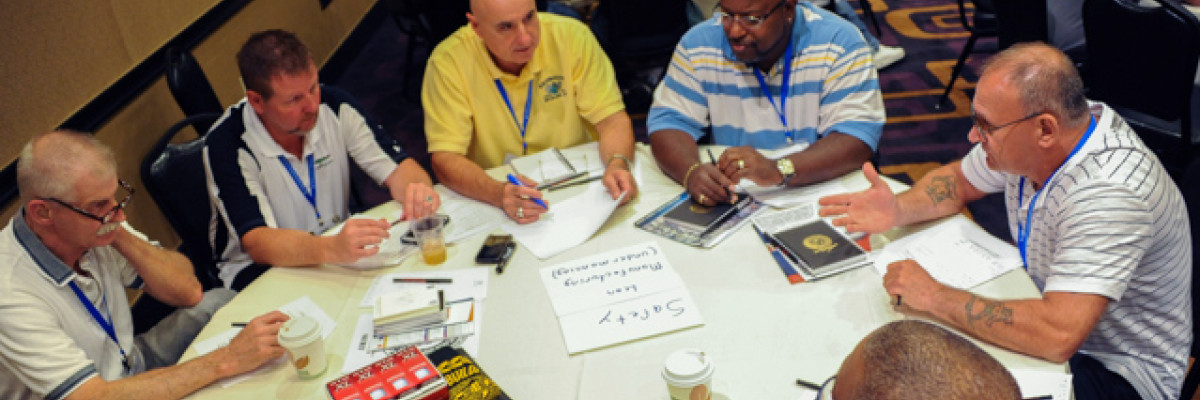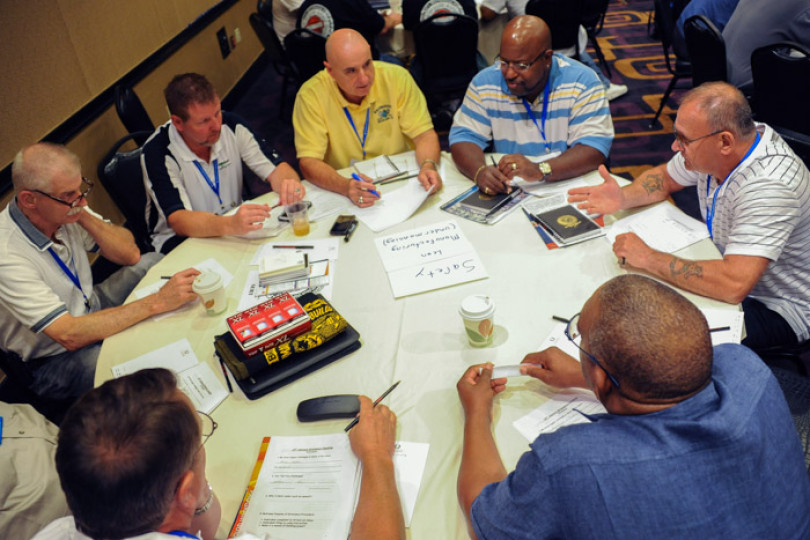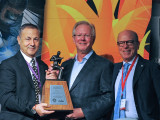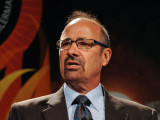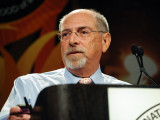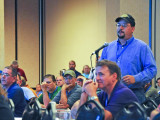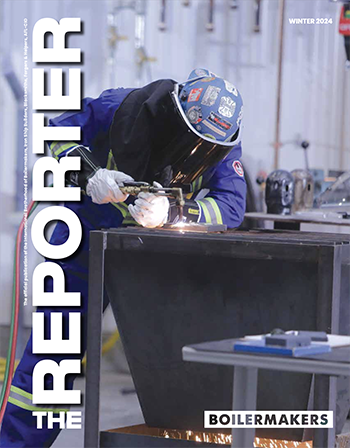Members practice handling a grievance during a breakout session led by Ruth Needleman of the National Labor College.
View Photo Gallery (5 photos)
Event offers numerous learning opportunities
MORE THAN 250 members attended the Industrial Sector Operations Conference July 22-25 in Las Vegas, setting a new record for participation. The event was held at Planet Hollywood and featured three days of speaker presentations and break-out sessions.
“Preparing for the future is what this conference is all about,” International President Newton B. Jones told ISO members in his opening remarks. “And to do that, we need to expand our knowledge and skills as union leaders.”
IP Jones described the many challenges facing unions today, including the assault on labor by the far right, political extremism, new free trade deals, and oppression by multinational corporations. He stressed the importance of working with other unions on a global basis to counter anti-labor forces.
He concluded with an introduction of Carlo De Masi, Secretary-General of the Italian Federation of Electrical Utility Workers (FLAEI), who offered greetings from his union and welcomed cooperation between FLAEI and the Brotherhood. IP Jones presented De Masi and FLAEI National Secretary Vito Loiacono with a sculpture signifying excellence in Boilermaker craftsmanship. The sculpture depicts a human form holding a rivet gun and is named the Charles W. Jones Award in honor of our late President Emeritus.
Among other guest speakers were Brian Doherty with ULLICO, Phee Jung-sun with IndustriALL, and Bob McCall and Bill Arnold with Bank of Labor.
Canada’s top labor leader addresses group
KEN GEORGETTI, President of the 3.3-million-member Canadian Labour Congress, gave the keynote address July 23. He described how the war on labor has forced Canadian unions to adopt new strategies to counter extreme anti-union legislation.
He said Bill C-377, passed by the conservative-dominated House of Commons, would have created onerous new financial reporting requirements. The bill went on to the Senate, which is also dominated by conservatives, with expectations that it would become law.
Georgetti described how labor succeeded in gutting the bill by building broad coalitions with groups that have not traditionally been strong union supporters. Instead of contesting the legislation through protests and other conventional tactics, Canadian unions amassed support by focusing on shared interests and the overall unfair nature of the proposed law. The coalition convinced 16 conservative senators to support amendments that essentially blocked the bill’s passage.
“The surprising thing [about anti-union forces in Canada and the United States] is the attacks are the same, the funding comes from the same sources, and they do the same things,” Georgetti said.
Bluestone traces rise and fall of U.S. economy
NOTED LABOR ECONOMIST and professor Barry Bluestone of Northeast University in Boston gave conference participants a review of economic history in North America since the 1920s. He said the concentration of wealth in the hands a small number of wealthy individuals coupled with too little money for consumers to drive the economy led to the Great Depression.
“We had soaring stock prices but underneath it a weak economy,” he noted. “This was the 1920s. Sound familiar? If you don’t have much consumption and you don’t have much investment, and you don’t have government spending, and you can’t export, the economy falls apart.”
Professor Bluestone said key pillars of the robust U.S. economy during the 1950s, 1960s, and early 1970s included a strong Labor Movement and government investments in education, technology, infrastructure, and other areas.
He said the United States must return to major government investments and a resurgent Labor Movement if the American economy is to regain its strength in the future.
“If we don’t push for this, we’ll never get back to the glory days,” he concluded.
Listening session, breakouts promote discussions
IN A FIRST-of-its-kind initiative created by the AFL-CIO, the ISO conference conducted a listening session in which conference participants were invited to engage. The goal was to encourage members and staff to share recommendations about how the federation should proceed in an era of declining membership and raging anti-union attacks. AFL-CIO-affiliated unions across the country were also invited to take part during their own meetings and conferences.
An ISO panel that included AAIP/D-ISO Tyler Brown, DGA D-PA Bridget Martin, and O-ISO Bobby Godinez II, moderated the session. They later forwarded recommendations to the federation for consideration at its September convention in Los Angeles.
Breakout sessions covered topics such as lodge finances, collective bargaining, grievance handling and arbitration, health and safety, healthcare, organizing, mediation, and railroad issues. The breakouts were led by Labor attorneys, government officials, academics, and International staff members.
